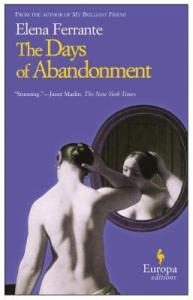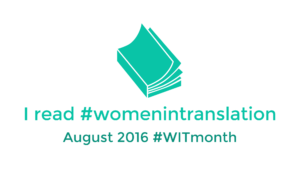 On the day when the nation is shocked and grieving after a devastating earthquake, that has destroyed entire villages and resulted in a significant loss of life, I don’t know how appropriate it is to share their literature, perhaps in the case of this particular novel, it serves to put things in perspective.
On the day when the nation is shocked and grieving after a devastating earthquake, that has destroyed entire villages and resulted in a significant loss of life, I don’t know how appropriate it is to share their literature, perhaps in the case of this particular novel, it serves to put things in perspective.
For while the protagonist of this novel may have felt her world was coming to an end, knowing how quickly and without warning life and home can be snatched away, might prompt us get over the more indulgent grievances of the heart.
 A national bestseller for almost an entire year, The Days of Abandonment shocked and captivated its Italian public when first published.
A national bestseller for almost an entire year, The Days of Abandonment shocked and captivated its Italian public when first published.
“One April afternoon, right after lunch, my husband announced that he wanted to leave me.”
Like an orchestrated composition that begins with a quiet, solo voice and rises to a crescendo with the addition of more instruments, Ferrante’s novel and its female character move from reasonable, melodic harmony to loud, discordant cacophony.
“I listened to him attentively, I contradicted him calmly, I didn’t ask him questions of any kind nor did I dictate ultimatums, I tried only to convince him that he could always count on me. But I have to admit that, behind that appearance, a wave of anguish and rage was growing that frightened me.”
Like the stages of grief, The Days of Abandonment charts the stages of decline following a lost love, beginning with the irony of a love more fierce than it was when it was present, then the deterioration, as the realisation and reality of life without it comes to pass for this mother of two children, cooped up in her apartment one hot August, with only the sad figure of a morose cellist living downstairs to observe her descent.
The abandoned woman acts terribly reasonably, only to deteriorate into desperate disillusionment. Like madness descending, the loss of love and the feeling of abandonment rages through the various emotions like a tempest, no person or animal immune to its violent, destructive force.
“The circle of an empty day is brutal and at night it tightens around your neck like a noose.”
It is shocking in how far the madness delves and astounding as it reaches a turning point and she is able slowly to perceive herself and the illusion of what she thought she had, for what it really was.
“It was really true, there was no longer anything about him that could interest me. He wasn’t even a fragment of the past, he was only a stain, like the print of a hand left years ago on a wall.”
Elena Ferrante observes the minutiae of human emotion and suffering, the obstinacy of a grasping, possessive love, the effect of our behaviour on those around us and the resilience of the human spirit.
Exhausting, terrifying, ferocious, we are both beast and beauty.
Elena Ferrante is the pseudonym of an Italian novelist, whose true identity remains a mystery, author of the four novels in the Neapolitan tetralogy My Brilliant Friend, The Story of a New Name, Those Who Leave and Those Who Stay and The Story of the Lost Child. The Days of Abandonment was the first of her novels to be translated into English by Europa Editions in 2005.
Buy The Days of Abandonment via Book Depository






Still have yet to read any Ferrante! Her books have been sitting on my TBR pile forever and I really must get around to them! Great review!
LikeLiked by 1 person
This was the first one translated when most of us had never heard of Elena Ferrante, it seems like a long time coming, knowing this came out in English 11 years ago, but great that there are a few more to read on the back list of translations.
LikeLiked by 1 person
Well done, Claire. 🙂
LikeLike
Thank you, a sad day.
LikeLike
Brilliant review Claire. Days of Abandonment was my first Ferrante, and like you I found it powerful and thrilling and exhausting. I loved how the ‘abandonment’ was both in the sense of having been abandoned but also a sense of abandon i.e. a loss of control. It’s a clever book, impassioned and slightly terrifying. But very, very good.
LikeLiked by 1 person
Yes, a sense of abandon and ‘an absence of sense’ the phrase her husband uses, but which she comes to actually inhabit and understand more thoroughly. The contrast between how measured, calm and in control she is in the beginning, the language really hooking the reader in, with little idea of what is to come and what she will become was astounding, breathtaking, frightening, I was afraid for her! So good, to have contained that whole cycle in a novel, I can’t wait to read more of her older work, this was a bit of a treat for me for summer, most of the other books I’ve read have authors I read for the first time, its such a pleasure to read a familiar author, and discover a work so totally original.
LikeLiked by 1 person
I’m so curious about this book but almost afraid to read it. Great review!
LikeLiked by 2 people
I wouldn’t be afraid Valorie, you would find it interesting I am sure knowing your particular interests. It’s a novel that comes full circle, it leaves us with hope and a warning.
LikeLiked by 1 person
OK, I’ll be brave!
LikeLiked by 1 person
Bravo! Bonne Courage 🙂
LikeLike
It is a bit of tour de force, isn’t it? Out of interest, how did you find it relative to the Neapolitan novels? Abandonment had a big impact on me at the time of reading, but when I look back at her work it’s My Brilliant Friend that has settled best in my memory.
LikeLiked by 1 person
‘Tour de force’ aptly describes it Jacqui. Interesting to make the comparison, I guess this novel reminded me of the initial experience of reading My Brilliant Friend, which is certainly the stand out novel of the four in the series, in that it quickly pulls the reader in close, making the revelations about what’s going on in the mind of the protagonist all the more shocking for being so close to it when they are revealed. So similar feelings with regard to character portrayal.
I can’t imagine that I will forget the experience of reading this one and I was particularly interested to read it knowing it was the first to be translated. I don’t think the series succeeds to emulate that experience past the first book, because we already have that familiarity with the character, but I’d like to read more of her work, just for that exposure to new characters and the way she gets inside their minds and juxtaposes how they are supposed to be/act versus the reality of their often shocking thoughts and little witnessed actions.
LikeLike
You almost have me convinced I should read Ferrante (I’ve been rather out off by the hype….)!
LikeLiked by 1 person
Yes, well this one harks from way, way back before the hype, often a good place to start and certainly captures her particular talent for insightful character portrayal.
LikeLiked by 1 person
Just like kaggsysbookishramblings I have been very put off by the hype. But a positive review from you makes all the difference, and I’ll put Ferrante on the list. Devastating new from Italy.
LikeLike
I did enjoy the Ferrante series, thought the first book is most definitely the most powerful, particularly because Ferrante has that ability to lure the reader in quietly and then deliver the shocking blow, peeling back the layers of a character before putting them back together again. Inevitably in a series, it gets drawn out, so it’s good to read one of her novels where it is just that, one novel, beginning, middle, end.
LikeLiked by 1 person
Sad news indeed. Great post, Claire. I experienced similar feelings while reading the book. The level of madness that occurs had an almost surreal element to it, as is Ferrante’s use of language to capture the Olga’s emotions and grief process. I am so interested in reading more of Ferrante.
LikeLiked by 1 person
Yes, I think her real talent is in character portrayal, that introspective point of view, showing how they react to certain events and circumstances, in a really compelling way.
LikeLiked by 1 person
Apart from the Neapolitan novels I’ve only read The Lost Daughter. I wonder how much of the shorter novels made it into the series?
LikeLiked by 1 person
How did you find The Lost Daughter compared to the series? This one is quite different to the series, the narrative taking place over a short period and staying pretty much with one character, I guess by the time she wrote the series he was becoming more ambitious in terms of the characters and the timeframe covered.
LikeLike
The hype has bothered me, which is a rubbish reason for not reading especially as th usual popular books are terrible bestsellers…it seems that once again you speak to my soul…and more importantly my wallet.
LikeLiked by 1 person
Yes, Elena Ferrante’s works had been around a very long time before My Brilliant Friend suddenly became a word of mouth sensation. And it’s true that often the book that has been most widely read by an author isn’t always the one that most appeals to us as individual readers. I am happy that I read her before the hype though as I too tend to avoid books that been overly hyped. But bravo really, considering it’s a translation, something many readers avoid.
LikeLiked by 1 person
Pingback: Top Reads 2016 – Word by Word
Pingback: Ties by Domenico Starnone (Italy) tr. Jhumpa Lahiri – Word by Word
Pingback: Frantumaglia, A Writer’s Journey by Elena Ferrante tr. Ann Goldstein – Word by Word
Pingback: Playing Catch-Up: Elena Ferrante, Pamela Paul, Joey Comeau, and Jesse Ruddock – Consumed by Ink
Pingback: A Catalog of Birds by Laura Harrington – Word by Word
Pingback: Troubling Love by Elena Ferrante – Word by Word
Pingback: Elena Ferrante Shares 40 Favourite Books by Female Authors – Word by Word
Pingback: The Lying Life of Adults by Elena Ferrante translated Ann Goldstein – Word by Word
Pingback: Best Books Read in 2021 Part 2: Top 10 Fiction – Word by Word